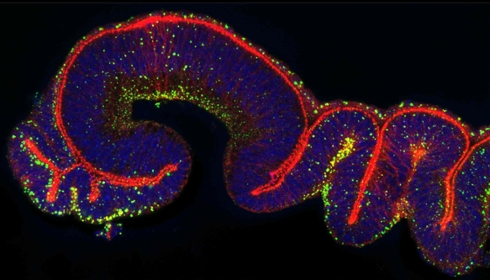Tags
"Research"
Notes from Wehrli Lab, OHSU

Fluorescence image of Drosophila wing disc in cross-section. Cell nuclei in blue, membranes in red, and a protein complex unique to Wnt signaling in green.
After several weeks in a fruit fly lab, I now feel quite confident in my ability to dissect larvae, create new crosses from different fly strains, and prepare tissues for microscopic imaging. Although I had never performed these techniques just two months ago, I now carry them out from memory on a regular basis. Without realizing it, I have learned how to identify many of the common Drosophila mutants that are used to create experimental crosses. I am also learning how to combine various protein or RNAi constructs in a single Drosophila line in order to interrupt or better visualize components of the Wnt signaling pathway. However, the most amazing thing to me is how much my dissection skills have improved. On my first day, I was shocked that I would be expected to remove organs from a larva only two or three millimeters long. Now, I can perform the task readily, although not nearly as quickly as my more experienced co-worker, Misha. I still have a lot to learn about the mechanisms involved in Wnt signaling. Understanding the research is far more difficult than simply carrying out the procedures. While I now know quite a bit about working with fruit flies, the complexities of the signaling pathway still elude.
Continue reading Notes from Wehrli Lab, OHSU
Wehrli Lab Notes, Daniel Lybrand '13
I am currently working at OHSU in the lab of Marcel Wehrli, Ph.D. The lab studies development in Drosophila (fruit flies) and focuses on the Wnt signaling pathway, one that features prominently in developmental biology research. My first week at OHSU has introduced me to a completely new area of biology. Most of my prior research experience has been in plant physiology. I have never worked with Drosophila before and know almost nothing about their development, so I am guaranteed to learn something new every day.
As a novice in the field, I learn from both Marcel and his research assistant, Misha (also a Reedie). I don’t yet have a project of my own, so I usually assist Misha with her experiments. Some of what I learn is completely new – techniques that I have never seen before.
In the past week, I have learned how to distinguish between male and female flies, how to tell a virgin from a fly that has never mated, how to dissect a fly larva, and how to identify the imaginal discs within the larva that eventually develop into various appendages. Other things are familiar but must be re-learned, as different labs carry out basic protocols in different ways. Antibody staining fruit fly larvae is very different from staining plant tissues!
Continue reading Wehrli Lab Notes, Daniel Lybrand '13
Notes from a Paris Biology Lab, Presidents Summer Fellowship

Maya with lab partners
This is the first of a series of blogs about the adventures of a Reed President's Summer Fellow. I am a student of philosophy learning the ropes of interdisciplinary studies for two months in Paris, France. I am focusing on the philosophic implications behind scientific research in a microbiology lab at ENS-Cachan led by Dr. Bianca Scalvi. The research at this lab is based on trying to understand the initiation of DNA replication.
I am neither a scientist, nor a philosopher. I am simply someone who wants to understand the way our society works. I have a background in chemistry, and spent a summer synthesizing organic compounds in a lab directed by Dr. Youngblood at UNT. That experience offers me an advantage in the microbiology lab. I am familiar with the environment of a laboratory and I am able to understand the basics of the research without too much trouble. My background in philosophy seems to have been with me since I was a child, yet I have only come to realize how much I enjoy the discipline when I started at Reed College two years ago. I have taken some courses in philosophy at Reed, and I try to approach each situation I find myself in with an open and philosophic mind.
Continue reading Notes from a Paris Biology Lab, Presidents Summer Fellowship
